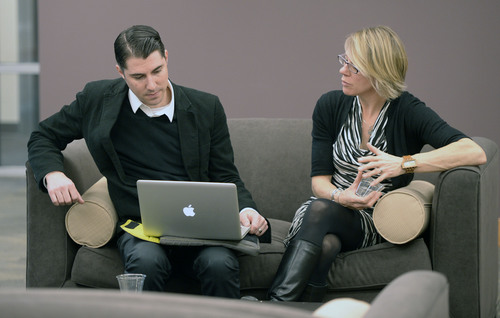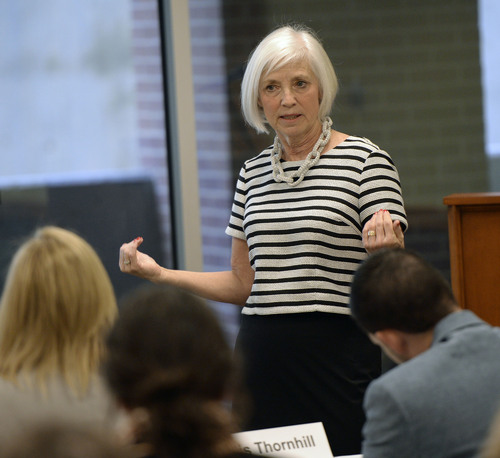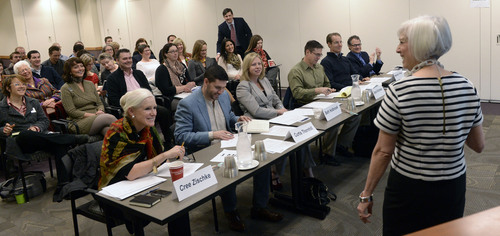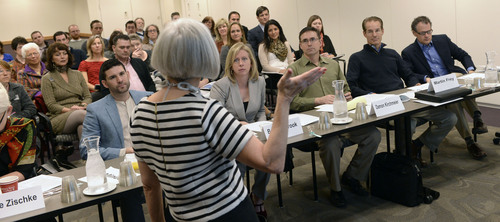This is an archived article that was published on sltrib.com in 2014, and information in the article may be outdated. It is provided only for personal research purposes and may not be reprinted.
Shawn Peterson, a fifth-generation farmer who heads the Green Urban Lunch Box program in Salt Lake City, knows the importance of grant writing.
Money from the government, private donors, corporations or foundations provides most of the funds that keep non-profits such as his viable.
Friday, he got a big boost.
He successfully completed the Community Foundation of Utah's first annual Utah Fund Social Investors Forum process, and he received double the $10,000 his group requested.
The Community Foundation of Utah put out a call for investments earlier this year, telling nonprofits throughout the state it would give winners up to $50,000 in an unusual process. The original 150 applicants were whittled down to 20 and then to six.
Fraser Nelson, executive director of the Community Foundation of Utah, said that in stark contrast to a typical grant application, nonprofits were required to submit their application on a single page, asked to submit a clear solution to a defined problem and told to provide evidence that their idea had impact and could be sustainable. The nonprofits were asked to request a specific amount of money.
Friday at Westminster College, the Green Urban Lunch Box, Salt Lake City Bicycle Collective, Spy Hop Productions, Utah Nonprofits Association, Canyonlands Field Institute and AAA Fair Credit Foundation put together 10-minute presentations to a group of judges from the business community, who then used 10 more minutes to ask questions.
Other experts and investors attended as audience members, some of whom considered making additional donations. Audience members were allowed to vote on their favorite presentation among the six groups.
According to Nelson, the judges awarded two $20,000 grants Friday — to Green Urban Lunch Box and The Salt Lake City Bicycle Collective. Two additional groups received money from other sources.
The Green Urban Lunch Box, which has three employees who work to empower people to grow their own food using the resources available in their communities and by helping people think creatively about how food is grown and what they eat, asked for $10,000.
Peterson requested money for his group's Fruit Share Program, which helps supply fresh foods to local food banks. He works with property owners and volunteers to harvest excess fruit from homeowners' trees that would otherwise go to waste. Last year, program volunteers rescued more than 12,000 pounds of food. With the extra money, Peterson's group hopes to more than double that in 2014.
The nonprofit also received an additional $5,000 to help it with a plant incubator space at its Salt Lake City hub.
Peterson said he found the new grant process used by the Community Foundation of Utah unusual. Typically, grants consist of submitted documents with no personal contact. However, that trend has been changing.
"Funders want to meet and understand you. You are treated more like they are investing in a for-profit business," he said. "I wouldn't be surprised to see this across the country."
Jeramy Lund, board chairman for the Community Foundation of Utah, said that getting twice the money a group asked for — which happened with Peterson's group — is not typical in a grant cycle. But he said the Green Urban Lunchbox was the clear favorite of the voting audience as well as the judges.
"The Utah Fund is founded in investing in innovative sustainable ideas," he said. "These were the two ideas that clearly demonstrated those criteria to the judges. This investment will help them fund themselves as opposed to continuing to seek more donations to keep their idea alive or extend their ideas."
Nelson said her organization was also establishing a mechanism to provide mentor capital to all six organizations to ensure their success.
Utah was the last state to see a community foundation established. The Community Foundation of Utah, founded in 2009, now has nearly $30 million in assets. It and its donor advisors have granted nearly $9 million to community organizations in Utah and beyond.
Martha Wunderli, interim executive director for the Fair Credit Foundation, one of the six finalists, said that making connections through the unconventional process was valuable.
"A lot of people don't recognize that nonprofits can be economic drivers," she said. "This is not charity, but really economic development."
The Salt Lake City Bicycle collective, which also received $20,000, helps participants obtain a bicycle and teaches them the skills to maintain it. The idea is to reduce youth obesity, help improve air quality, provide adult mentors for at-risk youth and help students learn the basics of engineering by being taught how to rebuild or maintain bicycles.
Twitter: @tribtomwharton









